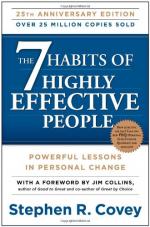|
This section contains 796 words (approx. 2 pages at 400 words per page) |

|
Proactive v. Reactive
There are proactive people and reactive people. Being proactive means taking the initiative to solve a problem, develop a new idea or reach out to others – even one’s opponents or enemies – to find solutions and reach higher levels of efficiency and productivity. Highly effective people don’t pass the buck; they take responsibility and take action. They don’t blame a situation or conditions for their behavior.
Reactive people are the polar opposite of proactive people. In empowering the things that control us, we become reactive. Reactive people are often happy when the sun shines and not so happy when it rains. They are impacted by how well or poorly other people treat them. Reactive people are driven by emotions; proactive people are compelled to action by values. We all know of people who have faced impossible challenges yet are able to maintain emotional strength...
|
This section contains 796 words (approx. 2 pages at 400 words per page) |

|




